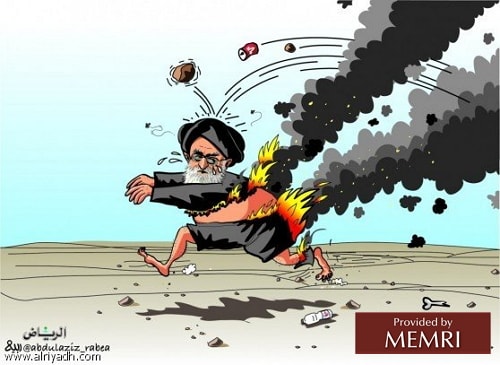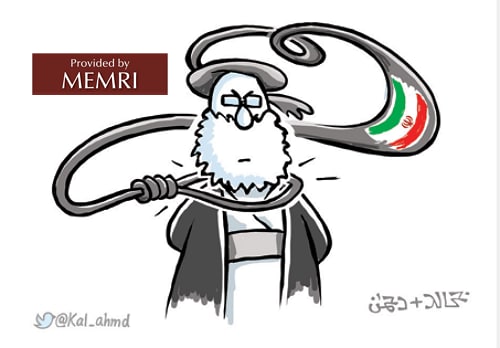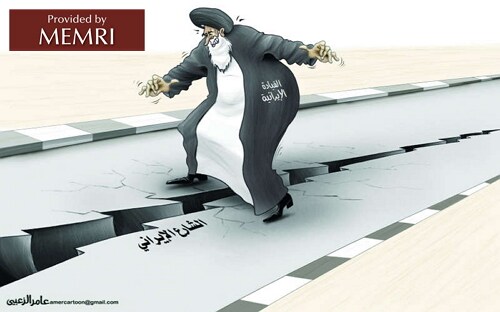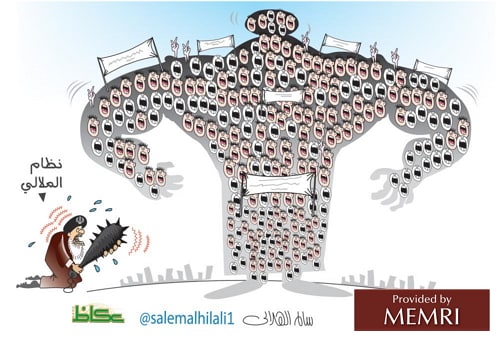The popular uprising that broke out in Iran on December 27, 2017,[1] and within days spread across the country, has gotten a lot of attention in the Gulf countries – Saudi Arabia, Bahrain, and the UAE – which consider Iran their foremost enemy, and which, they say, is interfering in their affairs and inciting their Shi'ite populations against their regimes, and is also directing from afar the fighting against them in Yemen.
The overall silence of the leaders and senior officials in the Gulf countries on the subject of the unrest in Iran is noticeable. One exception was UAE State Minister for Foreign Affairs Anwar Qarqash, who tweeted: "The protests in Mashhad and other Iranian cities are an opportunity [for the Iranian regime] to conduct rational [self] criticism and to prioritize the benefit of the domestic [arena] over Tehran's adventurism in Arab [countries]. [What will] benefit Iran and the region is building at home and growth, not stirring up the Arab world."[2]

Minister Qarqash's tweet, retweeted by UAE Foreign Ministry, December 28, 2017
Despite the leaders' silence, the Gulf press, particularly the Saudi press, have expressed great delight at the uprising in Iran. As the protests spread, they are being covered very prominently by the leading newspapers, with front-page headlines and commentary by top analysts. Examples of recent headlines are "Iranians' Anger Is Expanding," "Tsunami Rocks Clerics' Throne," and "The Iranian People: We Don't Want an Islamic Republic."[3] Numerous articles emphasizing the economic factors underpinning the protests are also being published; they are justifying the protests against Iranian Supreme Leader Ali Khamenei, and calling on the Gulf countries and the entire world to support the Iranian people and aid them in their protest. One article even urged the U.S. to intervene militarily in Iran and attack Iranian military bases and other facilities.[4]
In addition, cartoons pointing up the crisis of the Iranian regime in light of the uprising are being published.

Saudi 'Okaz daily's January 1, 2018 front page headline: "The Republic of the Ayatollahs Is Toppling"

Kuwaiti Al-Siyassa daily's January 2, 2018 front page headline: "The Revolution of the Poor and Hungry Threatens the Seat of the Turbaned Shah"
In this context, it should be noted that, in contrast to the sympathetic coverage of the Iranian uprising in most of the Gulf countries, the reaction of Qatar's press has been very restrained. During the first week of protests, the Qatari dailies refrained from publishing prominent reports and articles about them. An exception was a December 31 column in the Qatari daily Al-Watan, by Mazen Hamad, that refrained from taking a stand on the uprising, and even hinted that the reports about it were not credible.[5]On January 3, a week after the outbreak of the uprising, the Qatari press published a handful of articles about it, but these too refrained from taking a clear stand and avoided sharp criticism of the Iranian regime. They dealt mostly with the economic demands of the protesters and the Iranian public's fundamental dissatisfaction with the regime.[6] The character of the coverage in the Qatari press presumably reflects the rapprochement between Qatar and Iran since the outbreak of the Gulf crisis in June 2017.[7]
The following are excerpts from articles in the Gulf press on the popular uprising in Iran:
Saudi Press: The Iranian People Have Had Enough Of The Regime's Tyranny; The World Powers Must Help Them
As noted, the Saudi press published many articles expressing delight and optimism at the unrest in Iran and calling on the world to support the Iranian people's protests. The Saudi Al-Riyadh daily dubbed it "the Freedom Revolution," and other leading Saudi dailies described the situation of the Iranian regime as, for example, "the ayatollahs are on the edge of the abyss," and the uprising, for example, as "a revolution against hypocrisy and falsity" and depicting it as Iran purging itself of the ayatollahs who had looted its resources for three decades. Other articles expressed hope that the unrest heralded a new future for Iran and for the world.[8]
In its January 1 editorial, titled "The Point of No Return," Al-Riyadh said that the protests were the result of Iran's foreign policy and its repression of its citizens, stating that the situation in Iran would never again be as it was before the unrest broke out: "What is happening in Iran is the natural outcome of the lean years of oppression, repression, a deteriorating economic situation, gross interference in the affairs of [other] countries, and the billions of dollars [that have been spent] on support for terror organizations at the expense of the livelihoods of the helpless Iranian citizens, who have two options: repression and submission, or imprisonment and torture. The anti-regime protests in most of Iran's cities came in response to a long series of policy [decisions] by the regime, which did not include the Iranian citizens in its priorities but left them at the end of the list, if [they made it onto the list] at all...
"With regard to the statements by the Iranian officials that 'foreign forces' are driving the outpouring of rage – such statements are illogical, and are blatant proof of an attempt to divert attention from the real causes of the outbreak of the clashes – that is, the ongoing repression and unbounded oppression to which the Iranian people have been subjected for decades. The situation in Iran will never again be like it was before the outbreak and spread of the protests. The people in Iran have had enough of the behavior of the tyrannical regime."[9]
In its January 1 editorial, titled "The Just Revolution against the Lying Regime," the Saudi daily 'Okaz stressed that the Iranian regime's policy was illegitimate in the eyes of the Iranian people, and called on the countries of the world to help the Iranian people in their uprising: "The opposition to the Rule of the Jurisprudent and its theory regarding the exporting of the revolution and resources from Iran is being heard loud and clear, and it is attracting the attention of the world, and clarifying unambiguously that Iran's imperialistic aspirations have not cast their shadow [merely] on the region around it, but also deep within Iran, and have left Iran without any popular support...
"Not only have the Iranian government and the regime of the ayatollahs brought down the foundations of the country and squandered its resources, but they have become a source of danger to the world and to the [Iranian] people. The world powers must recognize this tragedy, reach out to aid this oppressed people, and help prevent the damage [that may be caused] to the rest of the countries in the world."[10]

Cartoon in the Saudi Al-Riyadh daily, January 1, 2018: Iranian Supreme Leader Ali Khamenei runs for his life, with his robes on fire
Columnist Hani Al-Zahiri, who writes in the Saudi daily 'Okaz, called on the U.S. to support the Iranian people's protests without delay by staging a military attack on Iranian military bases and airports. He stressed that this must happen before other elements, such as Turkey and Syria, intervene and help the regime to suppress the uprising, as happened in Syria. He wrote: "The Russians won in Syria after the popular uprising there because the international community stood by as the Al-Assad regime oppressed [the Syrian people], and did not intervene militarily to defend the citizens, but made do with announcements and decisions by the UN Security Council. This is [exactly] what will happen in Iran today if the U.S. does not quickly attack the regime's military bases and airports to save the hungry Iranians who are being murdered in the streets for several days now...
"The forces of the free world now have a golden opportunity to topple the world's most tyrannical and terroristic regime by providing the Iranian revolution with military support as quickly as possible, before new players come in to suppress [the Iranian uprising] – because forces like Turkey are likely to step in to defend the Iranian regime on the pretext of fighting the Kurds and defending [Turkey's] borders from them, and the Russians, too, are likely to seek new interests and deals in Iran..."[11]
Abd Al-Rahman Al-Rashed, former editor-in-chief of the Saudi London-based daily Al-Sharq Al-Awsat and also former director-general of the Al-Arabiya network, wrote in his December 30 column in Al-Sharq Al-Awsat that the Iranian regime had assumed that presenting its achievements in Iraq, Syria, and Lebanon would make it popular at home, but that the Iranian people opposed this foreign policy and were now giving voice to their rage. He wrote:
"Indeed, in comparison with other countries in the region, Iran is an advanced country in terms of its military industry, but it is still one of the poorer countries [in the region]. This is the problem of regimes like the Iranian regime, such as Cuba's, North Korea's, the USSR's, Yugoslavia's, East Germany's, Libya's, South Yemen's, Syria's, and more. These are regimes that collapsed because they were concerned only about military and security supremacy, while their countries remained poor in every other aspect.
"In Iran, not [only] does the Islamic Revolutionary Guards Corps [IRGC] run security, but it has taken over everything, large and small, and during the Ahmadinejad presidency it expanded its influence by taking over even the largest economic institutions, including the refineries. It is only natural that the day will come when the regime in Tehran will [have to] face the anger of the majority [of the Iranian public] that supported the rise of the regime four decades ago thinking that their lives would improve, but they have become worse. It is unreasonable [to think] that the Iranian people are currently capable of challenging the regime's repression apparatus. But with its uprisings, that have broken out periodically, it shows the world a different picture. The militias of the republic of the ayatollahs may have reached Damascus, Mosul, Beirut, Gaza, and Yemen, but they cannot enforce their control in Mashhad."[12]
In his January 2 column, Al-Rashed presented various scenarios for further developments of the uprising in Iran, including: the regime putting it down by force, control in the country being seized by power groups, or the collapse of the regime such that Iran becomes a failed state like Libya or Syria. He added that the last scenario was not likely, and that such a collapse was not in the interest of the Gulf countries, since "it would have dangerous ramifications that will spill over Iran's [borders] to the entire region." He also noted that the Iranian regime could only survive through self-examination and reform, and through breaking away from its imperialist policy.[13]
SUPPORT OUR WORK


Cartoon in the Saudi Al-Watan daily, January 2, 2018: The turban of Iran's ayatollahs has become a noose
UAE Daily: They've Had Enough! The Situation In Iran Has Reached The Boiling Point
In its December 31 editorial, the UAE daily Al-Khalij compared the situation in Iran to a boiling cauldron, and added that what was unique about this wave of protests, as opposed to previous ones, was the direct calls against Iranian President Hassan Rohani and Supreme Leader Ali Khamenei – which are unprecedented and are of great concern to the regime heads. It stated: "The protests that concluded with the wounding of dozens of people and the arrest of hundreds have brought several messages home. They are that this is indeed a genuine crisis, that the people can't take any more, and that the current policy has failed, as have the rulers...
"These protests are reminiscent of the mass demonstrations of 2009 in most of Iran's cities by the supporters of [presidential candidate] Mir Hossein Mousavi, in protest against the fraudulent presidential elections won by Ahmadinejad, that ended with dozens killed and hundreds arrested, and with house arrest for Mousavi and Sheikh Mehdi Karroubi, to this very day. The popular Iranian activity against the ruling religious and military leadership, then, is nothing new; for a long time, the protests in the cities of Iran have been demanding improvement in working and wage conditions, and an end to unemployment. But the recent protests have special meaning, because the demonstrators have deviated from their silence, having had enough; they have uttered direct calls against the president and the supreme leader – which led the authorities to see the demonstrations as illegal and to call [on the public] not to participate in them, because of fear of their ramifications, and fear that they would spread – and [also fear] that they will snowball out of control.
"The cauldron is boiling. How long can [the regime] control the height of the flames?"[14]

Cartoon in UAE daily Al-Bayan, December 31, 2017: The chasm opens beneath the Iranian leadership's feet
Bahraini Articles: The Iranian Regime Can No Longer Claim That The People Support It; There Is No Alternative To Replacing It
Al-Sayyed Zahra, columnist for the Bahraini daily Akhbar Al-Khalij, called the Iranian protests a popular intifada against the regime, and argued that after decades of repression, the Iranian people have discovered that there is no difference between the country's reformist and conservative camps. He wrote that the Iranians have realized that they must replace the regime in their country, and that for this reason even if this uprising fails, it will have shown that the Iranian regime does not have the support of its citizens:
"Throughout the decades since the rise of the Rule of the Jurisprudent in Iran, the people have gotten nothing from their rule but poverty, destruction, and ruin. The regime has looted the assets of the state, and everyone [in it] has been entangled in unmatched corruption. This story and these facts are well-known by the Iranian people... The Iranian people has for all these decades of the regime of the Rule of the Jurisprudent strained under the weight of poverty, unemployment, shortages, and social and political repression. These are the circumstances that led to the outbreak of this current intifada of the Iranian people...
"For many years, the Iranians have pinned their hopes on the so-called reformists in the regime circles, expecting them to adopt a different policy, both domestic and foreign. But ultimately the people discovered that depending on the so-called reformists is only an illusion, and that there is no difference between them and the so-called conservatives. The best proof of this is the current president, Rohani, whom the people saw as a reformist who would bring freedoms to the Iranians and end the regime's foreign crimes – but they discovered, in the end, that Rohani is no reformist and has no connection to reformism, and that during his term, the situation in all areas has become worse than ever.
"This is precisely what clarifies the main meaning of the current popular intifada in Iran. The outbreak of the intifada means that the Iranian people has had enough of the entire regime, and is no longer expecting anything good or hoping for improvement in the situation as long as this regime exists. The Iranian people have realized that if they have the right to avenge the lost decades, which they spent in misery and in sectarian and terrorist adventurism, and if they have the right to wish for a better future for themselves and for Iran, [then] there is no alternative but for the current regime to go...
"Even if the [Iranian] regime succeeds in repressing this current intifada, with the terrorism characteristic of it, as it has threatened to do, from now on it will no longer be able to claim that it has the support of the people, or that its criminal policy expresses the [will of] the people. With this intifada, the Iranian people seek to take back their free will, that does not depend on the regime, and to revoke the legitimacy of all the policies [of this regime], and even its very existence."[15]
Faysal Al-Sheikh, a columnist for the Bahraini daily Al-Watan, criticized the hypocrisy of people – both Iranians and Bahrainis – who condemned the Bahraini regime for its policy vis-à-vis the Shi'ite protests in the country yet remain silent in the face of the brutal suppression of the protests in Iran. He wrote: "Now that the Iranian people are rising up against this tyrannical [Iranian] regime, we can only wish them success in toppling the tyrannical dictator [Khamenei], for this [uprising] is merely a response to the growing injustice and oppression and the breaking of the will of the people, who are imprisoned at the drop of a hat and murdered even more easily.
"Those defending Iran, especially the traitors in Bahrain, the fifth column of collaborators inside [the country, i.e., Bahraini Shi'ites who support Iran], are the first to applaud the reports published by various human rights organizations like Human Rights Watch, Amnesty, the [UN] Human Rights Council and others, but they are also the first to remain silent when these organizations publish terrifying statistics about Iran, revealing the extent of the oppression, murder and denial of freedom [there].
"Why don’t you talk about Iran, you traitors, if you boast that you are 'human right activists'? The answer is simple, for how can a slave criticize his master? These people are nothing but slaves of the Khamenei regime that supports and finances them in and out of [Bahrain].
"We will talk with Iran in the same way its officials talk when they spew heresy about Bahrain... Don't [the Iranians] have a right to assemble and resist in peaceful ways? Don't they have a right to demand justice, equality and a fight against corruption, especially the flagrant financial corruption of Khamenei, who is robbing Iran of its wealth? Do they not have a right to freedom of worship...?
"The clowns among the Iranian officials who used to attack Bahrain in their statements [and accuse it of violating] freedoms and rights should take their own advice and apply it to their tyrannical regime. But that will never happen, because all we see in Iran today is the oppression and cold-blooded murder of the people, and an unceasing wave of arrests...
"May Allah allow us to witness the day of the collapse of this dictatorial regime and its tyrannical ruler."[16]
Article In Kuwaiti Daily: The Gulf Countries Must Support The Iranian Intifada – Just As Iran Interferes In Their Affairs
Columnist Ahmad Budustour, who writes in the Kuwaiti Al-Watan daily, also referred to the protests in Iran as the Iranian people's intifada against their regime. In his December 30 column, he described Iran as a police state that uses excessive force against its citizens, and called on the Gulf states to support the Iranian uprising, and thus respond in kind to Iran's subversion against the Sunni regimes in the Gulf. He wrote:
"The late U.S. president [Abraham Lincoln], who paid with his life for freeing the blacks, [would often say], 'No one loves their chains, even if they are made of gold.' The Iranian people is chained and persecuted by the tyrannical, bloody Iranian regime, and has suffered greatly. Over half live in wretched poverty, and suffer from harsh living conditions, but cannot express their suffering and their positions against the Iranian regime because the result of doing so will be repression, and everyone who does so is thrown into prison...
"The intifada of the Iranian people began in Mashhad, a city with a religious nature which houses a unique symbol – the tomb of Imam [Ali] Al-Reza [the eighth Shi'ite imam]. This intifada signifies the revolution against the clerics, because the protestors called out 'Death to the Dictator' – that is, the spiritual leader of the regime of the Rule of the Jurisprudent, Mr. Khamenei – and 'Death to Rohani' – the president of the republic that has so far failed to improve the standard of living of the Iranian people; indeed, the situation has gotten even worse during his term.
"The Iranian regime invests billions in the IRGC, and in the Basij, which acted against the protestors. [Iran] is a police state that understands nothing but the language of violence, and handles quiet demonstrations with barbarism and excessive force. It is not so interested in the Iranian people; it is more interested in remaining [in power] and in the continuation of the regime...
"The Gulf countries, particularly Saudi Arabia, the UAE, and Bahrain, who share similar positions vis-à-vis the Iranian regime, must support the intifada of the Iranian people, and act in kind towards this regime that interferes in the internal affairs of the Gulf countries and supports extremist young people so that they will rise up against the political regimes in the Gulf. Therefore, these countries must give the Iranian regime a double dose of its own medicine, in order to save the Iranian people from the hell in which it is living."[17]

Cartoon in Saudi daily 'Okaz, January 1, 2018: The "regime of the mullahs" fears the uprising of the masses
[1] For more on the popular uprising in Iran, see MEMRI Special Dispatch No. 7256, Popular Uprising Against The Iranian Regime And Its Policy – 2017, December 31, 2017.
[2] Qarqash's statements were retweeted by the UAE Foreign Ministry (@MOFAUAE) on December 28, 2017. Also, on December 26, the day before the protests broke out in Iran, Bahraini Foreign Minister Khaled bin Ahmad Aal Khalifa tweeted: "Iran is viable; the Islamic Republic is transient." Aal Khalifa reiterated this on December 30. @Khalidalkhalifa, December 26 and 30, 2017.
[3] Al-Yawm (Saudi Arabia), January 1, 2018; 'Okaz (Saudi Arabia), January 2, 2018; Akhbar Al-Khalij (Bahrain), January 1, 2018.
[4] For more articles calling on the world to intervene in Iran, see Mahmid Al-Mahmid, Akhbar Al-Khalij, Bahrain, January 1, 2018.
[5] Al-Watan (Qatar), December 31, 2017. The silence in the Qatari press on the protests in Iran prompted criticism from the Saudi press, which accused Qatar of conspiring with the Iranian regime and of lack of journalistic integrity. See, for example, 'Okaz (Saudi Arabia), January 2, 2018.
[6] Al-Watan (Qatar), January 3, 2018. One article, by Zafar Al-'Ajami in the Qatari daily Al-Arab, did take a harsher line, criticizing Iran and warning that it may try to deal with the uprising by instigating crises in the Gulf states and threatening Saudi Arabia, Bahrain, the UAE and Kuwait. Al-Arab (Qatar), January 3, 2018.
[7] On the outbreak of the Gulf crisis, see MEMRI Inquiry & Analysis No. 1315, Uproar In The Gulf Following Alleged Statements By Qatari Emir Condemning Gulf States, Praising Iran, Hizbullah, Muslim Brotherhood And Hamas, May 25, 2017.
[8] Al-Riyadh, 'Okaz, Al-Watan (Saudi Arabia), January 2, 2018.
[9] Al-Riyadh (Saudi Arabia), January 1, 2018.
[10] 'Okaz (Saudi Arabia), January 1, 2018.
[11] 'Okaz (Saudi Arabia), January 3, 2018.
[12] Al-Sharq Al-Awsat (London), December 30, 2017.
[13] Al-Sharq Al-Awsat (London), January 2, 2018.
[14] Al-Khalij (UAE), December 31, 2017.
[15] Akhbar Al-Khalij (Kuwait), January 1, 2018.
[16] Al-Watan (Bahrain), January 2, 2018.
[17] Al-Watan (Kuwait), December 30, 2017.




